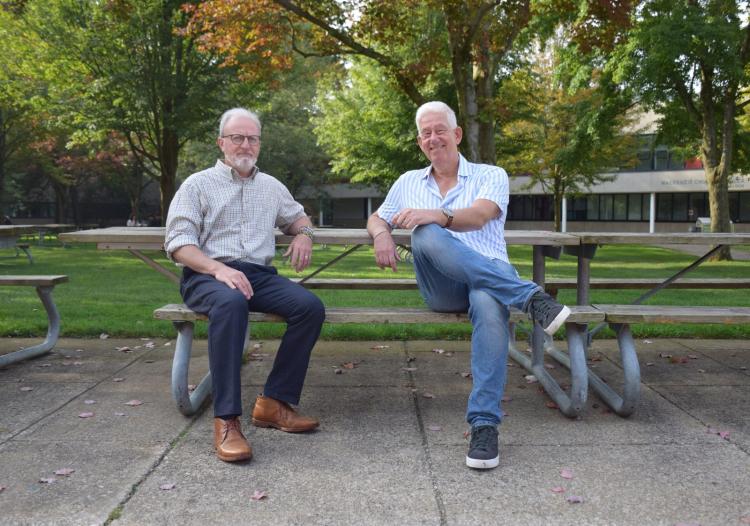How do communities imagine public spaces and heritage narratives that speak to the problematic nature of their past?
This is the question Michael Ripmeester wants to tackle in his ongoing research into how public spaces shape public conversation and memory research that is now taking on a new international dimension.

Professor of Geography and Tourism Studies Michael Ripmeester (right) is kicking off a new international new research collaboration exploring how public spaces shape public conversation and memory. Working with him at Brock is Associate Professor of Communication, Popular Culture and Film Russell Johnston (left).
The Professor of Geography and Tourism Studies recently travelled to Adelaide in Australia as a visiting scholar at the University of South Australia, sharing his work in a public lecture and kicking off a new international collaboration.
"We've done lots of work on how the public looks at monuments and public spaces where there's a heritage narrative that is contested or understood to be toxic or problematic," says Ripmeester. "Now we are thinking about how to move beyond criticizing and move forward in such a way that breaks down polarities rather than enhancing them."
In addition to previewing the upcoming research project, Ripmeester's public lecture outlined the various positions that have emerged as people around the world reckon with public monuments that represent oppression in different forms.
"There are some people who say contested monuments should be left alone because they're a part of our history," he says. "A second approach is that we have a duty to remove them as quickly as possible because they are toxic."
Ripmeester notes that he means "toxic" both figuratively and literally, pointing to research in the U.S. about how Black Americans living amongst Confederate monuments may become physically ill.
"And then there's another group of people who suggest we need to consider whether removing a monument actually has any lasting effect," he says. "These scholars are then asking whether public spaces can recontextualize history, either by adding to or replacing monuments to extend the story being told."
He suggests that the monument may therefore actually mean less than the narrative attached to it.
This third approach is shaping the next phase of Ripmeester's research, a collection of studies being conducted in collaboration with Senior Lecturer Matthew Rofe of the University of South Australia and Professor Jacky Bowring of Lincoln University in New Zealand.
"Removing monuments from public view can play a role in removing the problems from discussion," he says. "Jacky, Matthew and I are thinking about how we can address this by modifying public spaces so that they're not telling harmful or hurtful stories or preventing members of the public from feeling comfortable or seen or heard."
The new project will involve three studies in Canada, Australia and New Zealand focusing on each nation's legacy of British colonialism.
Given this history, the researchers will collaborate with local Indigenous partners as they move forward.
Each of the researchers will also assemble teams to tailor the work to their respective locations.
At Brock, Ripmeester will be joined by Associate Professor Russell Johnston in the Department of Communication, Popular Culture and Film, with whom he has previously worked on local questions of public commemoration.
The perspectives of those joining the research teams, as well as the disciplinary lenses of the lead researchers, will further contribute to the research.
"Jacky, as a landscape architect, may be thinking about collections of material and symbolic content in terms of design, whereas Matthew may be thinking from an urban planning perspective and how one might plan to connect these spaces with the wider city," he says. "And for me, as a geographer, I'm really interested in the ways in which spaces not only represent reality, but create it."













